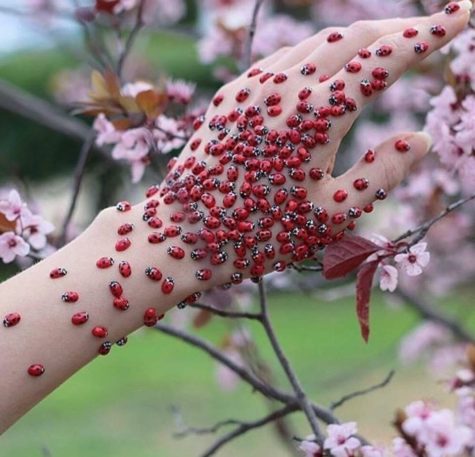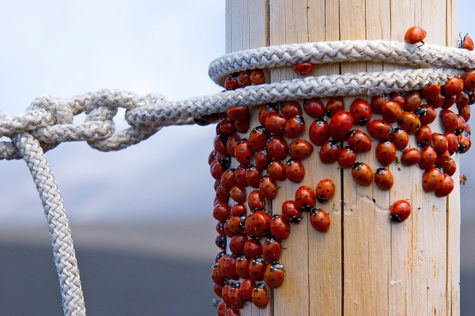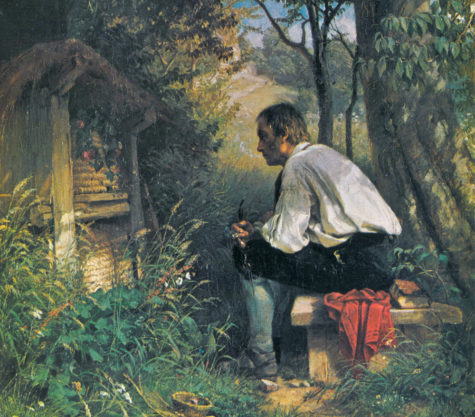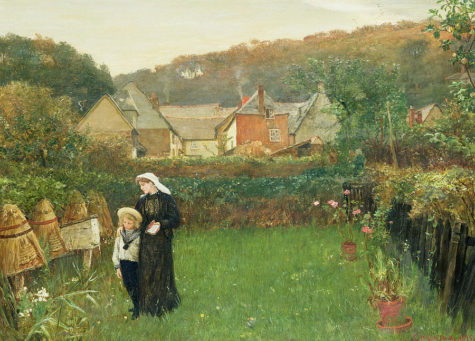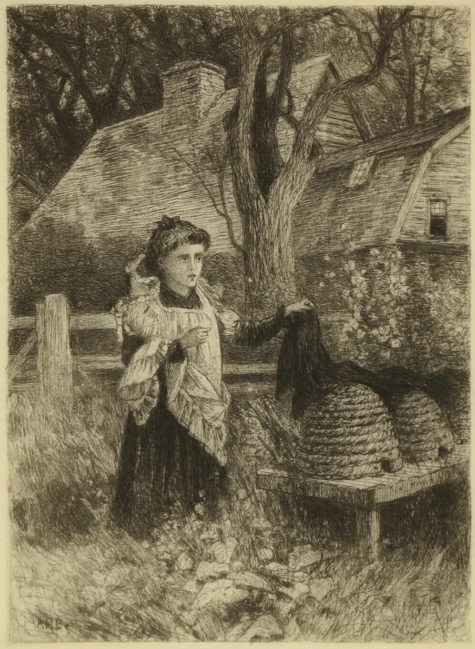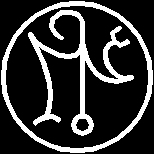Protection
Ladybird Ladybird Fly Away Home
This traditional verse relates to ladybirds, brightly colored insects commonly viewed as lucky. We’ve all heard this rhyme. There are dozens of different variations. But what does it mean?
The name ladybird contains a reference to Mary, mother of Jesus, often referred to as Our Lady. It is possibly connected with a story that after prayers for help Our Lady brought Ladybird beetle to destroy a plague of plant-destroying pests. According to other lore, farmers recite the rhyme to save the insects who do them this service before setting fire to stubble fields.
The English version has been dated to at least 1744. The verse has several popular forms, including:
Ladybird, ladybird fly away home,
Your house is on fire and your children are gone,
All except one, and her name is Ann,
And she hid under the baking pan.
A shorter, grimmer version concludes:
Your house is on fire,
Your children shall burn!
Among children, it is common to place the ladybird on their hand or blow it from their clothing and make a wish while reciting the rhyme. My favorite variation is this one, written early in the 19th century:
Lady-bird, Lady-bird, fly away home,
The field mouse is gone to her nest,
The daisies have shut up their sleepy red eyes
And the birds and the bees are at rest
Because of the religious connotation, one speculation would date the rhyme back to the 16th century and have it sung as a warning at a time when there was legislation against Catholics.
More variations include the following:
Ladybird, ladybird, fly away home,
Your horse is on foot, your children are gone;
All but one, and that’s little John,
And he lies under the grindle stone.
Dowdy-cow, dowdy-cow, ride away heame,
Thy house is burnt, and thy bairns are tean.
Marybug, fly away,
your house is on fire,
your wee mother weeps
Sky-winger, fly away,
your house is in flames,
your children together in tears
This info came from wikipedia. You can find an infographic with the different varieties of ladybird insects at Totally Random, and some nice ladybug pictures at Way Cool Pictures.
If you are interested in Ladybugs, you can check out this detailed post about Ladybug Totems and Guides, and a crazy Ladybug Toothache Cure.
Telling The Bees
There was a time when almost every rural British family who kept bees followed a strange tradition. Whenever there was a death in the family, someone had to go out to the hives and tell the bees of the terrible loss that had befallen the family. Failing to do so often resulted in further loss such as the bees leaving the hive, or not producing enough honey or even dying.
Traditionally, the bees were kept abreast of not only deaths but all important family matters including births, marriages, and long absence due to journeys. If the bees were not told, all sorts of calamities were thought to happen. This peculiar custom is known as “telling the bees”.
Humans have always had a special connection with bees. In medieval Europe, bees were highly prized for their honey and wax. Honey was used as food, to make mead—possibly the world’s oldest fermented beverage—and as medicine to treat burns, cough, indigestion and other ailments. Candles made from beeswax burned brighter, longer and cleaner than other wax candles.
Bees were often kept at monasteries and manor houses, where they were tended with the greatest respect and considered part of the family or community. It was considered rude, for example, to quarrel in front of bees.
The practice of telling the bees may have its origins in Celtic mythology that held that bees were the link between our world and the spirit world. So if you had any message that you wished to pass to someone who was dead, all you had to do was tell the bees and they would pass along the message. Telling the bees was widely reported from all around England, and also from many places across Europe. Eventually, the tradition made their way across the Atlantic and into North America.
The typical way to tell the bees was for the head of the household, or “goodwife of the house” to go out to the hives, knock gently to get the attention of the bees, and then softly murmur in a doleful tune the solemn news. Little rhymes developed over the centuries specific to a particular region. In Nottinghamshire, the wife of the dead was heard singing quietly in front of the hive:
“The master’s dead, but don’t you go;
Your mistress will be a good mistress to you.”
In Germany, a similar couplet was heard:
”Little bee, our lord is dead;
Leave me not in my distress”.
Telling the bees was common in New England. The 19th century American poet John Greenleaf Whittier describes this peculiar custom in his 1858 poem “Telling the bees”.
Before them, under the garden wall,
Forward and back,
Went drearily singing the chore-girl small,
Draping each hive with a shred of black.
Trembling, I listened: the summer sun
Had the chill of snow;
For I knew she was telling the bees of one
Gone on the journey we all must go!
And the song she was singing ever since
In my ear sounds on:—
“Stay at home, pretty bees, fly not hence!
Mistress Mary is dead and gone!”
In case of deaths, the beekeeper also wrapped the top of the hive with a piece of black fabric or crepe. If there was a wedding in the family, the hives were decorated and pieces of cake left outside so that the bees too could partake in the festivities. Newly-wed couples introduced themselves to the bees of the house, otherwise their married life was bound to be miserable.
If the bees were not “put into mourning”, terrible misfortunes befell the family and to the person who bought the hive. Victorian biologist, Margaret Warner Morley, in her book The Honey-Makers (1899), cites a case in Norfolk where a man purchased a hive of bees that had belonged to a man who had died. The previous owner had failed to put the bees into mourning when their master died, causing the bees to fall sick. When the new owner draped the hive with a black cloth, the bees regained their health.
In another tale, an Oxfordshire family had seventeen hives when their keeper died. Because nobody told them about the death, every bee died. There are plenty of such tales in Morley’s book.
The intimate relationship between bees and their keepers have led to all sorts of folklore. According to one it was bad luck to buy or sell hives, because when you sell one, you sell your luck with your bees. Instead, bees were bartered for or given as gifts. If bees flew into a house, a stranger would soon call. If they rested on a roof, good luck was on its way.
But the relationship between bees and humans goes beyond superstition. It’s a fact, that bees help humans survive. 70 of the top 100 crop species that feed 90% of the human population rely on bees for pollination. Without them, these plants would cease to exist and with it all animals that eat those plants. This can have a cascading effect that would ripple catastrophically up the food chain. Losing a beehive is much more worse than losing a supply of honey. The consequences are life threatening. The act of telling the bees emphasizes this deep connection humans share with the insect.
Source: Amusing Planet
Nebiru
From the Fifty Names of Marduk in the Necronomicon Spellbook.
The Forty-Ninth Name is NEBIRU.
This is the Spirit of the Gate of MARDUK. Manages all things in their ways, and moves the crossings of the stars after the fashion known to the Chaldeans. His Word is DIRGIRGIRI.
To be invoked when you feel a need for order and pattern in your life, or someone else’s. When a sense of security and safety is desired or needed, of comfort and well-being, and of peace.
Important note:
“The Signs and Powers may be summoned after the Priest has ascended to that step on the Ladder of Lights and gained entrance to that Sacred City. The Signs should be engraved on parchment or sealed in clay and placed upon the altar at the Calling. And in the perfumes should be of cedar, and strong, sweet-smelling resins. And the Calling be to the North.”
More information:
According to Sumerian mythology, Marduk was the God who defeated the Ancient Ones long before the creation of matter as we know it.
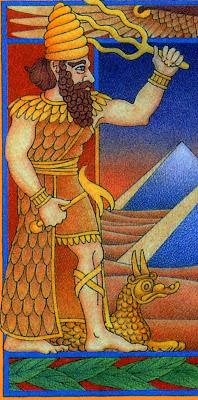 Against him in battle were the fierce TIAMAT, KINGU, and AZAG-THOTH. Once he had destroyed these demons, he created the universe from the flesh of TIAMAT, and humanity from the blood of KINGU mixed with his own breath.
Against him in battle were the fierce TIAMAT, KINGU, and AZAG-THOTH. Once he had destroyed these demons, he created the universe from the flesh of TIAMAT, and humanity from the blood of KINGU mixed with his own breath.
You will come across these names in the description of the Fifty Names, which were titles given to Marduk by the Elder Gods after he had helped them to defeat the Ancient Ones.
Related links:
- Pagan Calendar – Marduk’s Feast Day
- The Powers That Be – Marduk The God
- Widdershins – Marduk Legends and Stories, the original translation of the Enûma Eliš, and the Fifty Names of Marduk as originally given in the ancient tablets.
Tuku
From the Fifty Names of Marduk in the Necronomicon Spellbook.
The Seventeenth Name is TUKU.
Lord of Baneful Magick, Vanquisher of the Ancient Ones by Magick, giver of the Spell to MARDUK KURIOS, a most fierce enemy. His Word is MASHSHAMMASHTI.
There are times when we feel that someone else may be practicing magick against us. The feeling is hard to describe to anyone else, but we know it when it happens. If you are certain that magick is being used against you, that a spell has been cast or a curse sent in your direction, then the name and seal of this spirit will repel the evildoer as surely as if Archangel Michael had been summoned to rout Lucifer from Heaven. A most potent protection device.
Important note:
“The Signs and Powers may be summoned after the Priest has ascended to that step on the Ladder of Lights and gained entrance to that Sacred City. The Signs should be engraved on parchment or sealed in clay and placed upon the altar at the Calling. And in the perfumes should be of cedar, and strong, sweet-smelling resins. And the Calling be to the North.”
More information:
According to Sumerian mythology, Marduk was the God who defeated the Ancient Ones long before the creation of matter as we know it.
 Against him in battle were the fierce TIAMAT, KINGU, and AZAG-THOTH. Once he had destroyed these demons, he created the universe from the flesh of TIAMAT, and humanity from the blood of KINGU mixed with his own breath.
Against him in battle were the fierce TIAMAT, KINGU, and AZAG-THOTH. Once he had destroyed these demons, he created the universe from the flesh of TIAMAT, and humanity from the blood of KINGU mixed with his own breath.
You will come across these names in the description of the Fifty Names, which were titles given to Marduk by the Elder Gods after he had helped them to defeat the Ancient Ones.
Related links:
- Pagan Calendar – Marduk’s Feast Day
- The Powers That Be – Marduk The God
- Widdershins – Marduk Legends and Stories, the original translation of the Enûma Eliš, and the Fifty Names of Marduk as originally given in the ancient tablets.
Asaruludu
From the Fifty Names of Marduk in the Necronomicon Spellbook.
The Seventh Name is ASARULUDU.
Wielder of the Flaming Sword, oversees the Race of Watchers at the bidding of the Elder Gods. He ensures the most perfect safety, especially in dangerous tasks undertaken at the behest of the Astral Gods, his Word is BANMASKIM.
Like the Angel in Genesis, this Spirit protects a place, a home or temple, from negative psychic and magickal attacks. Like the Sixth Spirit, merely the pronunciation of his Word BANMASKIM is sufficient to dispel hostile influences when shouted to the four quarters. Maskim and Rabisu are the names of ancient Sumerian demons.
Important note:
“The Signs and Powers may be summoned after the Priest has ascended to that step on the Ladder of Lights and gained entrance to that Sacred City. The Signs should be engraved on parchment or sealed in clay and placed upon the altar at the Calling. And in the perfumes should be of cedar, and strong, sweet-smelling resins. And the Calling be to the North.”
More information:
According to Sumerian mythology, Marduk was the God who defeated the Ancient Ones long before the creation of matter as we know it.
 Against him in battle were the fierce TIAMAT, KINGU, and AZAG-THOTH. Once he had destroyed these demons, he created the universe from the flesh of TIAMAT, and humanity from the blood of KINGU mixed with his own breath.
Against him in battle were the fierce TIAMAT, KINGU, and AZAG-THOTH. Once he had destroyed these demons, he created the universe from the flesh of TIAMAT, and humanity from the blood of KINGU mixed with his own breath.
You will come across these names in the description of the Fifty Names, which were titles given to Marduk by the Elder Gods after he had helped them to defeat the Ancient Ones.
Related links:
- Pagan Calendar – Marduk’s Feast Day
- The Powers That Be – Marduk The God
- Widdershins – Marduk Legends and Stories, the original translation of the Enûma Eliš, and the Fifty Names of Marduk as originally given in the ancient tablets.
Nariluggaldimmerankia
From the Fifty Names of Marduk in the Necronomicon Spellbook.
The Sixth Name is NARILUGGALDIMMERANKIA or NARI-LUGALDIMMNKIA
The Watcher of the IGIGI and the ANNUNAKI. Sub-Commander of the Wind Demons. He will put to flight any maskim who haunt thee, and the foe of the rabisu. None may pass into the World Above or the World Below without his knowledge. His word is BANRABISHU.
A good Spirit for warding off feelings of aggravation and irritation, as well as the gnawing feelings of dread that sometimes come in the wee hours of the morning, when you feel lost and alone. Merely the pronunciation of the Word BANRABISHU at these times is sufficient to dispel most of these negative emotions. To be said with force and strength in the four directions.
Important note:
“The Signs and Powers may be summoned after the Priest has ascended to that step on the Ladder of Lights and gained entrance to that Sacred City. The Signs should be engraved on parchment or sealed in clay and placed upon the altar at the Calling. And in the perfumes should be of cedar, and strong, sweet-smelling resins. And the Calling be to the North.”
More information:
According to Sumerian mythology, Marduk was the God who defeated the Ancient Ones long before the creation of matter as we know it.
 Against him in battle were the fierce TIAMAT, KINGU, and AZAG-THOTH. Once he had destroyed these demons, he created the universe from the flesh of TIAMAT, and humanity from the blood of KINGU mixed with his own breath.
Against him in battle were the fierce TIAMAT, KINGU, and AZAG-THOTH. Once he had destroyed these demons, he created the universe from the flesh of TIAMAT, and humanity from the blood of KINGU mixed with his own breath.
You will come across these names in the description of the Fifty Names, which were titles given to Marduk by the Elder Gods after he had helped them to defeat the Ancient Ones.
Related links:
- Pagan Calendar – Marduk’s Feast Day
- The Powers That Be – Marduk The God
- Widdershins – Marduk Legends and Stories, the original translation of the Enûma Eliš, and the Fifty Names of Marduk as originally given in the ancient tablets.
Marutukku
From the Fifty Names of Marduk in the Necronomicon Spellbook.
The Third Name is MARUTUKKU
Master of the Arts of Protection, chained the Mad God at the Battle. Sealed the Ancient Ones in the Caves, behind the Gates. Possesses the ARRA star.
To be used especially when performing any occult ceremony in which there is danger, such as the invocation of demonic forces. The ARRA star is a five-pointed Pentagram, and is the universal symbol of protection. Protects the soul as well as the body.
Important note:
“The Signs and Powers may be summoned after the Priest has ascended to that step on the Ladder of Lights and gained entrance to that Sacred City. The Signs should be engraved on parchment or sealed in clay and placed upon the altar at the Calling. And in the perfumes should be of cedar, and strong, sweet-smelling resins. And the Calling be to the North.”
More information:
According to Sumerian mythology, Marduk was the God who defeated the Ancient Ones long before the creation of matter as we know it.
 Against him in battle were the fierce TIAMAT, KINGU, and AZAG-THOTH. Once he had destroyed these demons, he created the universe from the flesh of TIAMAT, and humanity from the blood of KINGU mixed with his own breath.
Against him in battle were the fierce TIAMAT, KINGU, and AZAG-THOTH. Once he had destroyed these demons, he created the universe from the flesh of TIAMAT, and humanity from the blood of KINGU mixed with his own breath.
You will come across these names in the description of the Fifty Names, which were titles given to Marduk by the Elder Gods after he had helped them to defeat the Ancient Ones.
Related links:
- Pagan Calendar – Marduk’s Feast Day
- The Powers That Be – Marduk The God
- Widdershins – Marduk Legends and Stories, the original translation of the Enûma Eliš, and the Fifty Names of Marduk as originally given in the ancient tablets.
